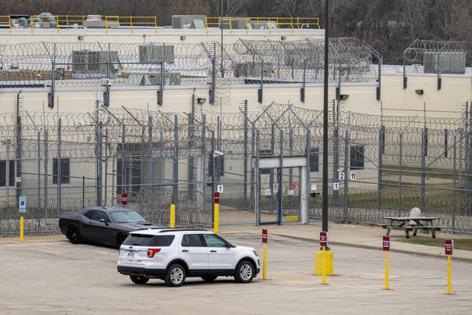Kansas ICE prison remains on hold as judge declines to reverse restraining order
Published in News & Features
KANSAS CITY, Mo. — A Kansas District Court Judge has again sided with the city of Leavenworth, dashing CoreCivic’s hopes of a reversal that would allow the company to begin housing immigrant detainees at its prison on the outskirts of town.
In a ruling published Friday, Judge John J. Bryant upheld the temporary restraining order he granted last month, ensuring the prison will remain empty — at least until the court issues a final ruling on the zoning dispute between the city and CoreCivic.
“The court believes that there are strong public policy arguments that have been made by both sides,” Bryant wrote. “However, this court does not believe it would be adverse to the public interest to have this issue properly settled while the temporary injunction is in effect.”
The for-profit prison company maintains that it should be allowed to reopen for the first time since 2021 under a contract it entered into with U.S. Immigration and Customs Enforcement this spring to detain roughly 1,000 people.
The city argues that for numerous reasons — including the prison’s history of chronic violence, drug abuse and understaffing — reopening would be unlawful unless the company first requested and received permission from local officials.
Bryant said he agreed with CoreCivic that “not much weight” should be given to the arguments about past abuses at the facility.
But he shared the city’s concerns about the dangerous precedent that could be set if CoreCivic was allowed to flout local laws that it chose not to comply with.
“However, it is common sense to this court that a city cannot continue to function if its inhabitants decide on their own that the decisions of the elected officials do not govern them,” Bryant wrote.
In court filings and hearings, CoreCivic attorneys argued that because the Leavenworth facility was originally grandfathered in as an acceptable use before the city changed its zoning laws to require a special use permit to operate jails and prisons, no such permission should be legally required.
“Taken as a whole, Defendant’s arguments can be boiled down to the idea that once it was approved to operate here (in 1992), that there is little to nothing Plaintiff can do to restrict their operation,” Bryant wrote.
Brian Todd, a spokesperson for CoreCivic, said the company “respects the judicial process and looks forward to the next steps” in presenting its case.
“We do not have any updates to share beyond the fact that we are pursuing all avenues to find a successful conclusion to this matter,” Todd said in an email statement.
Earlier this month, CoreCivic filed a counter complaint with the district court seeking a reversal of the Leavenworth City Council’s March decision rescinding its permission to operate without a special use permit. The next court hearing has been set for Aug. 6.
CoreCivic has argued repeatedly that it should be allowed to accept ICE detainees while its legal dispute with the city works its way through the courts.
“Defendant argues that they can be cited and sued for any problems they may cause between now and the final decision of the court,” Bryant wrote, noting CoreCivic’s suggestion that the city could be compensated for any damages.
“This ignores the fact that it would also tie up Plaintiff’s resources in citing occurrence and litigating each issue,” he wrote. “Whether it is emergency services or utilities, if personnel are needed to deal with Defendant’s emergencies, then it may be unable to address other emergencies at the same time. Compensation after the fact does not remedy that situation.”
Leavenworth City Manager Scott Peterson did not respond to a request for comment Friday afternoon.
_____
©2025 The Kansas City Star. Visit kansascity.com. Distributed by Tribune Content Agency, LLC.







Comments